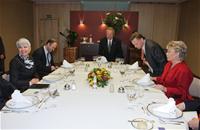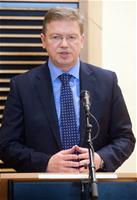Croatia at the final leg of EU accession but why are the last steps most difficult?
Dessislava Dimitrova, March 8, 2011
 Twenty years after the painful break up of former Yugoslavia and almost six years since the start of EU accession negotiations, Croatia is set to become the 28th member of the bloc. In order to end the negotiation process, the country has to formally close several chapters and to carry out the most difficult reforms form the “Judiciary and fundamental rights” chapter. “The only real problems that remain unresolved are those in chapter 23, all the other chapters have been negotiated and are coming to a closure, the negotiations on all the other chapters are over and are to be closed, but there are no more problems,” Viviane Reding, Vice-President of the European Commission responsible for Justice, Fundamental Rights and Citizenship, said during her visit in Zagreb on March 3.
Twenty years after the painful break up of former Yugoslavia and almost six years since the start of EU accession negotiations, Croatia is set to become the 28th member of the bloc. In order to end the negotiation process, the country has to formally close several chapters and to carry out the most difficult reforms form the “Judiciary and fundamental rights” chapter. “The only real problems that remain unresolved are those in chapter 23, all the other chapters have been negotiated and are coming to a closure, the negotiations on all the other chapters are over and are to be closed, but there are no more problems,” Viviane Reding, Vice-President of the European Commission responsible for Justice, Fundamental Rights and Citizenship, said during her visit in Zagreb on March 3.
On some of the unresolved issues the Commission notes an impressive progress even on the chapter where problems persist, Reding added, but the interim report on Chapter 23 presented earlier this week remains critical. According to the report, in order to provisionally close the most difficult chapter, the country has to fulfill several benchmarks that cover four main areas: judiciary, fight against corruption and organised crime, fundamental rights, as well as cooperation with the the tribunal in the Hague, ICTY.
Commenting on the report, EU Enlargement Commissioner Stefan Fule said that generally Croatia and its government have achieved considerable progress in the field of judiciary and fundamental rights, but not all closing benchmarks are met yet, which is why the Commission prefers the chapter to remain open.
“I expect that this report will focus minds in Croatia and efforts on these areas so as to ensure the timely and complete fulfillment of all the closing benchmarks,” Fule said. He added that the interim report did not include a position on the time needed for Croatia to meet the remaining benchmarks and that substance was more important than deadlines. “I know, however, that the Croatian Government has set as its own target the month of June and is backed by the Hungarian Presidency, who has made this one of the key priorities of its Presidency. I consider this to be highly ambitious, but I am encouraged by the priority Croatia attaches to completing the remaining work,” Fule added.
According to him, the end of the negotiation process entirely depends on Croatia meeting all the requirements in the remaining chapters, but it is also up to Croatia to maintain and accelerate this momentum. According to a resolution adopted by the European Parliament on February 16, Croatia's EU membership negotiations could be completed in the first half of 2011 provided Zagreb pushed ahead with reforms, but the biggest challenge could be "selling" the benefits of EU membership to a skeptical Croatian population.
The final stretch of the negotiation process, though, could turn to be quite a long and difficult one for the Croatian authorities, as they have to show not only in Brussels but in Zagreb too that their campaign to fight corruption and organised crime has been successful. The protests in the Croatian capital, as well as in several other major cities in the country, though chaotic and on the verge of hooliganism, show that the number of those dissatisfied with Prime Minister Jadranka Kosor’s policy is growing, as is the number of euroskeptics in the country. According to the latest Eurobarometer survey the majority of Croatian citizens think Croatia's EU membership would not benefit the country.
The snap elections, demanded by the opposition, however, would hardly solve the problems with discontent and growing euroskepticsm in the country, especially when it is close to becoming an EU member. The example of Bulgaria shows that each time a new government steps into office, it starts an argument about who has more merits – the cabinet, which started the accession negotiations, the one that closed them or the one that has really benefited from EU membership.
Following the meeting with Reding, Kosor said that the decision for elections is not taken in the street, but it is written down in the constitution. “I agree, however, that everyone has the right to protest if he has such a reason and the government  should listen to what protesters say. I think that we should do our best to close the negotiations, something in which have put a lot of efforts. No to violence, yes to protests, if there is a reason for them,” Kosor said.
should listen to what protesters say. I think that we should do our best to close the negotiations, something in which have put a lot of efforts. No to violence, yes to protests, if there is a reason for them,” Kosor said.
"When the time comes for new elections, we will present an account before the citizens of the country and they will be the only ones that will decide who will take the decisions for Croatia in the coming four years", she added. When asked by local journalists whether the protests could harm the negotiation process, Reding explained that the European Union would not interfere with issues, which the government is fully capable of solving itself. "I can only say as a politician that democracy is not perfect but they is the best system that exists worldwide, in democracies, people have the right to protest and the politicians have the obligation to listen to what they have to say and, if necessary, to make the appropriate changes in order to give an answer,” she said.
So far Kosor remains unyielding. She is not talking about any new reforms and is reiterating that the economic stability and successful negotiations remain among government’s top priorities. Recent data, however, show that support for the government has fallen to its lowest level, since such kind of research is being conducted in the country.
 Bakir Izetbegovic, Andrej Plenkovic | © Council of the EU
Bakir Izetbegovic, Andrej Plenkovic | © Council of the EU Aleksandar Vucic, Recep Tayyip Erdogan | © Serbian Presidency
Aleksandar Vucic, Recep Tayyip Erdogan | © Serbian Presidency Jean-Claude Juncker, Zoran Zaev | © European Commission
Jean-Claude Juncker, Zoran Zaev | © European Commission